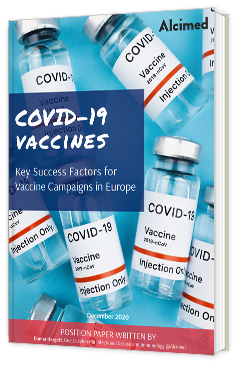

Dans cet article, Alcimed explore les éléments clés pour parvenir à une protection basée sur la population grâce à une vaccination réussie contre le COVID-19 en Europe.

"In April 2020, Bill Gates called COVID-19 a “once in a century pandemic” [1] placing it in the realm of the 1918 Spanish Flu. Almost a year into this pandemic, it is fair to say that while the world has not suffered similar mortality burdens, there have been similar levels of disruption to daily life and strain on medical resources. Much like the previous grand scale pandemic, easy access to non-symptomatic treatment has proved elusive. While many potential therapeutics have been tested, a single uniformly effective treatment across most patient groups is still not universally available.
This lack of treatment makes the need to rapidly develop, test, manufacture, and launch a global vaccination campaign all the more urgent if the world is going to begin to transition from crisis mode to effectively containing the pandemic and resuming normal life. On this front, the news is largely good, and several vaccine candidates are moving to the end of clinical trials toward approval.
Massive vaccination campaigns will begin the process of establishing enough immunity in the population to short circuit or disrupt widespread community spread. Achieving sufficient vaccination rates would create herd immunity, an often misunderstood term. Despite the term’s popular usage, herd immunity has never been achieved outside of large-scale vaccination campaigns as those that began to emerge in the 1950’s and 60s [2] and is thus better replaced with population-based protection. According to Kristian Andersen, an immunologist at the Scripps Research Institute, in terms of COVID-19 population-based protection without a vaccine [3], “We have never successfully been able to do it before, and it will lead to unacceptable and unnecessary untold human death and suffering.”
In this paper, Alcimed explores the key elements in successfully achieving population-based protection through successful vaccination against COVID-19 in Europe. Our discussion of the efficacy of a potential vaccine, logistics and public acceptance will show that the availability of a vaccine is the very first step of a long journey towards a normalization of the global health situation."